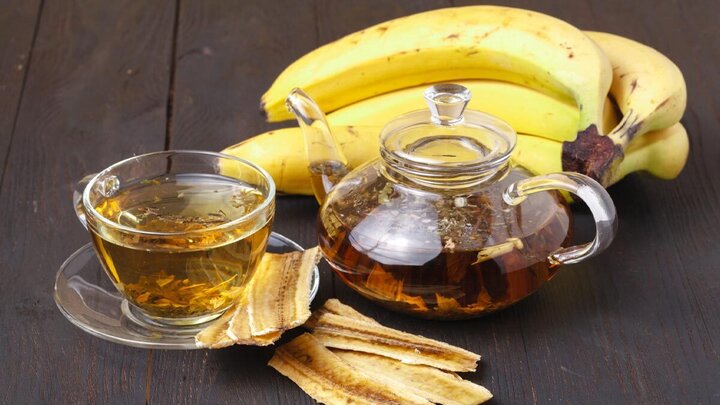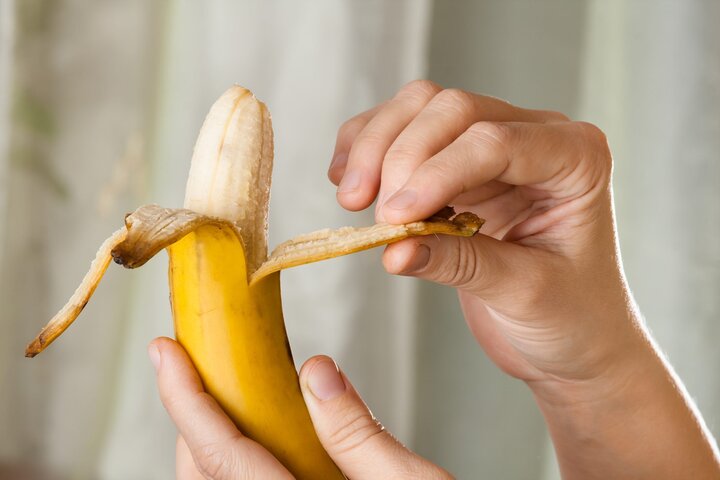Orange, tangerine or pomegranate peel tea is quite popular but banana peel tea is a new trend that brings some benefits such as helping you sleep well.
While tea is unlikely to replace natural liquid melatonin, some teas may still be beneficial for sleep quality. Learn about the benefits of banana peel tea for a good night’s sleep.
1. Some potential health benefits of banana peels
Reduce depression
The high tryptophan content in bananas, combined with the vitamin B6 in banana peels, may help reduce some symptoms of depression and other mood disorders. Tryptophan is converted to serotonin when broken down, which can help improve mood. Vitamin B6 may help improve sleep, which may have a positive effect on mood over time.
Digestive health
Banana peels are rich in fiber, which helps regulate the digestive system, reducing both constipation and diarrhea. This may be an especially important benefit of banana peels for people with Crohn’s disease or irritable bowel syndrome.
Better vision
Vitamin A can help keep eyes healthy and clear. This vitamin is abundant in both bananas and banana peels.
Packed with antioxidants that fight free radicals
Banana peels are rich in polyphenols, carotenoids, and other antioxidants that help fight cancer-causing free radicals in the body. Consuming banana peels, especially green, unripe ones, may increase antioxidant levels.
Note that studies on the anti-cancer properties of banana peels have been conducted in test tubes, not in humans. More research is needed to understand whether banana peels have the potential to reduce cancer risk in humans.

Banana peel tea is said to help induce sleep.
2. Why is banana peel tea effective in supporting good sleep?
Bananas are a fruit that is recognized as being rich in nutrients and are widely used from eating directly to making smoothies, breads, puddings, snacks … But banana peels are also useful when wanting to have a good night’s sleep.
Instead of throwing away banana peels, try turning them into a tea to sip before going to bed to help you sleep better. Banana peel tea, which tastes like bananas, is quite sweet and mild, similar to chamomile.
Banana peels have antibacterial properties and are rich in antioxidants and are also used to soothe conditions such as ulcers, anemia and inflammation. For example, in some parts of Nigeria, dried banana peels combined with yam powder are used to support the treatment of ulcers and other stomach ailments.
“While there are no controlled human trials proving the health benefits of banana peel tea, using banana peels to help improve sleep has been used for years in folk medicine,” says Megan Hilbert, a registered dietitian nutritionist at Top Nutrition Coaching. “Banana peels contain precursors to melatonin and serotonin, two compounds that help regulate circadian rhythms and aid sleep. Bananas also contain potassium and magnesium, which can lower blood pressure and relax the nervous system.”
Banana peels may also help improve overall health, which indirectly benefits sleep. Banana peels contain other nutrients like phosphorus, calcium, and vitamin B6; the more nutrients a diet contains, the healthier the gut microbiome. Research shows that good gut health can lead to better, longer, and more productive sleep.
3. Does Banana Peel Tea Work?
The effectiveness of banana peel tea is difficult to quantify without formal research, but sipping a warm, caffeine-free beverage about an hour before bed is a good habit to help you relax.
In general, using natural sleep aids is often helpful. Banana peel tea can be part of an effective evening routine, especially when combined with the nutrients in the tea, to help you relax and fall asleep.
4. Is banana peel tea dangerous?
Note that banana peel tea may not be suitable for people who need to monitor their potassium intake due to certain medications or medical conditions such as kidney disease.
Additionally, banana peels contain high amounts of tannins, which can have negative effects on some people, especially those who are very sensitive to tannins, causing nausea or allergic reactions.
Use organic bananas to minimize the amount of pesticides that the banana peel may absorb. Talk to your doctor or nutritionist before using banana peel tea.

Choose peels from organic bananas.
5. Banana Peel Tea Recipe
Dried Banana Peel Tea
- Banana Tea with Dried Banana Peels, as per the recipe published in the National Sleep Foundation article. This recipe calls for dried banana peels, which can be used as loose leaf tea. Drying a batch of banana peels allows you to make banana tea even if you don’t have fresh bananas on hand. Organic bananas are recommended for this recipe.
- Take any number of organic banana peels and cut them into 1-inch squares.
- Dry the peels in a food dehydrator. Or spread the peels out on a baking sheet and bake in the oven at 160 degrees Fahrenheit for five to seven hours or until the peels are completely dry.
- When you’re ready to make your tea, boil one to two tablespoons of dried banana peels in two to three cups of water for three to five minutes.
- Strain and pour the banana peel tea into a mug.
- Dried banana peels can be stored in an airtight container and used to make tea whenever you want. Discard dried banana peels after six months or if you see any signs of mold growth.
Fresh Banana Peel Tea
Ingredients:
- 1 banana, peeled only, preferably organic for health safety;
- Sea salt;
- Cinnamon (optional);
- Honey or maple syrup (optional);
- Milk (optional)
Directions:
- To make a cup of banana peel tea, cut off both ends of a ripe banana, remove the peel but keep the fruit for another use.
- Rinse the peels, chop them and place them in a pot.
- Pour in about 300-350ml of clean water, add a small pinch of sea salt, cover and bring to a boil, then remove from heat.
- Strain into a cup and sip immediately.
- Flavor the tea by:
Add a cinnamon stick while steeping or stir a pinch of cinnamon into the tea.
Sweeten the finished tea with a little honey or maple syrup.
Stir in a little milk if desired.





